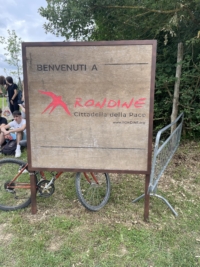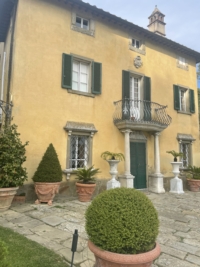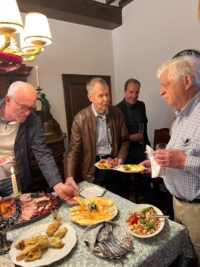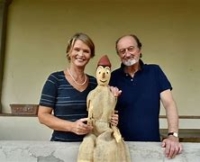
I’ve written about Rondine enough times that it might seem to you as if I chose this title because I had run out of more meaningful and useful ones. In this case, the title does make sense even if it is at least a wee bit overstated.
Every time I’ve worked with the folks at Rondine, something magical happens. This time, too.
As I mentioned in last week’s post, Gretchen and I headed there ten days ago for what was also our first trip involving an airplane since the pandemic began. We had been invited for Rondine’s end of year celebration at which I was scheduled to give two talks, one of which would be in Italian, a language I haven’t used professionally in half a century.
The trip came at a time when my mental batteries needed some charging, though I suspect I needed less of that than most folks. At any rate, the folks at Rondine came through once again in ways that reflect former Secretary of Defense Donald Rumsfeld’s quip about known knowns, known unknowns, and unknown unknowns. In this case, all three supercharged those metaphoric batteries sending me home with even more work to do than ever, the last contribution coming after we reached the boarding gate and then on the flight.
I’ve been a bit vague in places because some of the conversations were confidential and, in one case, I never got the name of the person I was talking with!
Rondine and Known Knowns
Rondine has always been a source of surprises.
In this case, that starts with the event itself, which I frankly didn’t research anywhere near enough before we left.
It had the strange name YouTopic Fest 2024. I just figured out that it is was bizarre attempt to adapt cool English terms into a title that must have meant something to someone. It was only when Rondine’s founder Franco Vaccari spoke it out loud and it sounded like utopia with a c rather than an a at the end that it fell into place.

Then, I realized that it, in fact, was a general festival that Rondine holds at the end of each academic year. More than a thousand people participated in the 10K walk that got things started. Five hundred or more attended each of the three days of the festival. There were talks on everything from peacebuilding (of course) to the mafia, the arts, and the school system.
And with the exception of the one panel I was on, it was all in Italian.
In it all, three things stood out that I sort of expected but not to the extent that I observed:
- The power of the Rondine method. I had met with the students in their core World House program on my first trip five years ago. This time, I got to see them actually living the values they had learned. They were poised and mature and had grasped core peacebuilding tools better than any group of grad students I’ve ever seen—and believe me, I’ve seen quite a few. They got it. They realized that peacebuilding really does begin with “me” and the way I deal with all of the relationships that I’m a part of.
- Ways of taking it beyond the core World House program. I spent a fair amount of time in the conclusion I wrote for The Rondine Method speculating about how it can be taken to scale. Obviously, there is only just so much space at a restored Italian hamlet which limits the number of students who can attend the World House. I was delighted to see that its leaders recognize this and have begun programs with high school students (see below) and, more interestingly, with training corporate leaders in ways that take them beyond what they would get from conventional consulting groups.
- Deepening my relationships with the team. I also got to spend a lot more time with the staff, especially Mauro d’Andrea, Jacopo Bencini, and Valentina Brocchi. We spent the most time this trip with Jacopo who loved the fact that I knew Bob Putnam and had planned to do research on the Italian new left as well as the French as part of my PhD dissertation. He even bought me a copy of the newspaper, ll Manifesto, which would have been part of that project had I gotten to Italy. In that discussion I remembered the Marxist anthem, Bandiera Rossa, which my thirteen-year-old grandson loves to sing. If you know the words, I then used it to end my talk in English by talking about Rondini in the plural and changing one word. Instead of Rossa, it becameBbandiere Ronine a la riscossa.
My Visits and the Known Unknowns
The Rumsfeldism I had the most trouble making sense of before I went to Rondine was his notion of the known unknown. How could we know about something that is unknown to us???????????
Now I found out. Not once, but twice.
I knew that we would be spending the first night at the villa that a friend of Miguel Diaz’s is restoring Cortona which is where the film “Under a Tuscan Sun” is set.

We invited Nick Kraczyna who had been my camp counselor at YMCA Camp Hazen when I was a kid and then my colleague when we both worked there while I was in college. Nick and already moved to Florence to start his career as an artist, and we hadn’t seen each other since 1969 or 1970. I wouldn’t dare try to make the case that we hadn’t changed in half a century, but we recognized each other immediately and then were able to talk through lots of things from both our pasts and presents that I had not expected. In particular, learned more than I ever had about the trauma that he had grown up with as a child born in war-torn Poland and the Soviet Union who then spent five years in a refugee camp in Germany before his family finally made it to the States (and to Hazen).

I learned about his kids (who are, of course, now well into middle age but I had only known them as toddlers). His daughter, Anna, has written a new translation of Pinocchio that tries to clean up the reputation of that fictional wooden scamp. Haven’t read it yet. It goes to the grandkids first. Oh and she also has a consulting practice that has a lot in common with Rondine’s work.

We also got to meet Emilce Cuda, who was invited to YouTopic Fest by Miguel Diaz, the same friend who got us to the villa. Cuda is a respected professor of theology in her native Argentina. More importantly here, her family and the Pope’s have known each other for decades, and Francis appointed her to be the first woman ever to be named to the Roman Curia through which he runs the church. Needless to say, we had some fascinating discussions about the role the Church could and should play in fostering sweeping social reform, including on questions of gender and homophobia.

The Serendipity of Unknown Unknowns
Then there were the things that I could never have expected in my wildest imagination.
- Rising Tide. Vaccari invited Gretchen and me as well as Miguel and his husband to dinner the night before the festival began. To our surprise, he had asked Patrick Oetting of the Rising Tide Foundation which has funded some of Rondine’s work. The foundation leans toward the libertarian side of things, so I was a bit surprised to find him there. But as the discussion wore on, I discovered that they were very interested in the implications of Eleanor Ostrom’s core design principles for managing shared resources and public goods and that he knew my friend and former student, Sam Staley, who is one of the leading libertarian applied thinkers from his long-time position as head of the DeVoe L. Miller Center at Florida State. Sam and I had already been trying to find a time to reconnect around Ostrom’s ideas, but now I learned that he was working with George Mason University’s Mercatus Center on campus polarization issues and that their group would be meeting this weekend at a conference and had included a young friend of mine without my having to do any matchmaking.
- Institute for Humane Education. I got a chance to spend some time with Julie Meltzer of the Institute for Humane Education which trains what it calls solutionaries especially among high school (liceo) students. I knew that Rondine had a program for the equivalent of high school juniors who spend a year studying at the village in what amounts to a domestic junior year abroad program. I had not realized that it was taking that project and making it part of the national curriculum and would be doing that work along with Julie and her organization. I, of course, put her in touch with Patricia Shafer, my coauthor and founder of Youth and Peace in Action, the largest and fastest growing organization with a similar mission here in the US.
- The flight home. never used to talk to people at airports and only grudgingly did so during a flight. This time was different. Though I can’t name names because we didn’t get far enough for me to ask their permission to include them, my run of utterly unknown unknowns continued after we arrived at the Rome airport. While waiting to board, we struck up a conversation with a retired senior banker at a huge bank whose name you would definitely recognize who had recently been at a discussion of the Northern Ireland peace process and wanted to know more—especially after I volunteered to help his son navigate political science grad school. On the flight itself, Gretchen and I were placed in separate rows and I sat between a young woman who is a grad student in clinical psychology (Gretchen’s daughter is a clinical psychologist) who is exploring her own bisexuality while living in the deep south and a woman about my age who works for a nonprofit that helps other nonprofits navigate leadership transitions. It helped that I could help her daughter figure out political science PhD programs to apply to.
Bottom Line
My life was full before we left. And, while I knew there would be new wrinkles added to my relationship with Rondine, I did not expect all of these other things to happen.
What fun!
The views and opinions expressed in this article are those of the author and do not necessarily reflect the official policy or position of the Alliance for Peacebuilding or its members.
